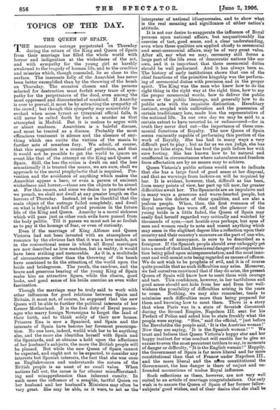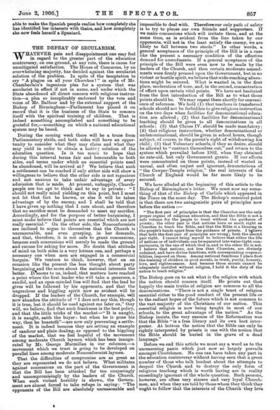TOPICS OF THE DAY.
THE QUEEN OF SPAIN.
THE monstrous outrage perpetrated on Thursday during the return of the King and Queen of Spain from their marriage has filled the whole world with horror and indignation at the wickedness of the act, and with sympathy for the young girl so harshly awakened to the tragedy of human life, and to the cruelties and miseries which, though concealed, lie so close to the surface. The insensate folly of the Anarchist has never been better exemplified than by the throwing of the bomb on Thursday. The occasion chosen and the persons selected for destruction must forfeit every trace of sym- pathy for the perpetrators of the deed, even among the most oppressed and discontented of mankind. If Anarchy is ever to prevail, it must be by attracting the sympathy of the crowd ; but though this sympathy may conceivably be evoked when some tyrant or tyrannical official falls, it will never be called forth by such a. murder as that attempted in Madrid. But it is useless to argue with or about madmen. Anarchism is a baleful disease, and must be treated as a disease. Probably the most efficacious treatment is silence and the absence of any- thing which can excite the victims of the mania to further acts of senseless fury. We admit, of course, that this suggestion is a counsel of perfection, and that it would not be possible to get the world to ignore an event like that of the attempt on the King and Queen of Spain. Still, the less the crime is dwelt on and the less sensationally it is treated the nearer, we are sure, shall we approach to themoral prophylactic that is required. Pre- vention and the avoidance of anything which makes the Anarchist appear a hero, or even a person of eminent wickedness and horror,—those are the objects to be aimed at. For this reason, and since we desire to practise what we preach, we shall not dwell at any greater length on the horrors of Thursday. Instead, let us be thankful that the main object of the outrage failed completely, and dwell on what is bright and full of good promise in the future life of the King and Queen. Anarchy is a moral sickness which will pass just as other such evils have passed from the body politic. Till it passes we must not be so foolish as to pay it the homage of fear, or even of curiosity.
Even if the marriage of King Alfonso and Queen Victoria had not been invested with an atmosphere of romance by the obvious fact that it was a love match, not in the conventional sense in which all Royal marriages are now described as love matches, but in reality, it would have been striking and memorable. As it is, a multitude of circumstances other than the throwing of the bomb have combined to fix the attention of the world upon the bride and bridegroom. The youth, the candour, and the brave and generous bearing of the young King of Spain make him an attractive figure, while the charm, good looks, and good sense of his bride exercise an even wider fascination.
Though the marriage may be truly said to work with other influences for good relations between Spain and Britain, it must not, of course, be supposed that the new Queen will be able to further the political interests of her former Motherland. It is the first duty of Royal person- ages who marry foreign 'Sovereigns to forget the land of their birth, and to think solely of their new homes. Princess Ena is now a Spaniard, and Spain and the interests of Spain have become her foremost preoccupa- tion. No one here, indeed, woilld wish her to be anything else, and the more she identifies herself with Spain and the Spaniards, and sb obtains a hold upon the affections of her husband's subjects, the more the British people will be pleased. But while the new Queen of Spain cannot be expected, and ought not to be expected, to consider any interests but Spanish interests, the fact that she was once an Englishwoman and understands the nature of the British people is an asset of no small value. When nations fall out, the cause is far oftener misulderstand- ing and misapprehension than inherent enmity.' In such cases the influence of a senitible, tactful Queen on her husband and her husband'si AT nisters may often be very great. She may be able, as it were, to act "as the interpreter of national idiosyncrasies, and to show what is the real meaning and significance of either nation's attitude.
It is not our desire to exaggerate the influence of Royal- persons upon national affairs, but unquestionably the exercise of tact, good sense, and a clear understanding, even when these qualities are applied chiefly to ceremonial and semi-ceremonial affairs, may be of very great value. After all, say what we may, ceremony still forms a 'large part of the life even of democratic nations like our own, and it is important that these ceremonial . duties should be well performed. And it has always been so. The history of early institutions shows that one of the chief functions of the primitive kingship was the perform- ing of ceremonial duties with precision and in the proper spirit. The King was the man who knew how to do the right thing in the right way at the right time, how to say the proper ceremonial words, how to deliver the public curses or the public blessings, and generally how to do public acts with the requisite distinction. Hereditary instinct, coupled with cultivation and the possession of certain traditionary lore, made him the representative of the national life. In our own day we may be said to a certain extent to have reverted to, or rediscovered—for in truth they never died out—the importance of these cere- monial functions of Royalty. The new Queen of Spain seems eminently capable of performing this portion of the work of Royalty. She has had in many ways a very difficult part to play ; but as far as we can judge, she has made no false steps, but has trod the path before her with sure footing. She has known how to be natural and unaffected in circumstances where naturalness and freedom from affectation are by no means easy to achieve.
Queen Victoria's public actions would seem to indicate that she has a large fund of good sense at her disposal, and that no warnine.s from lookers-on will be required. by her. It is evident, however, that, difficult as has been, from many points of view, her part up till now, far greater difficulties await her. The Spaniards are an impulsive and in many ways a generous and warm-hearted people, but they have the defects of their qualities, and are also a jealous people. When, then, the first romance of the Royal marriage has worn off, and the glamour of the young bride is a little faded, the Queen of Spain may easily find herself regarded very critically and watched by thousands of eyes,—not hostile eves perhaps, but eyes of men and women ready to note and resent anything which may seem in the slightest degree like a reflection upon their country and their country's manners on the part of one who, in moments of annoyance, is sure to be described as a foreigner. If the Spanish people should ever unhappily get into a mood of that kind, there is real danger of misrepresenta- tion being piled upon misrepresentation; and the most inno- cent and well-meant acts being regarded as causes of offence. We do not wish to be prophets of evil, and it is of course quite possible that no such difficulties may arise. Moreover, we feel ourselves convinced that if they do arise, the present Queen of Spain will know how to meet them with courage and tact. This confidence, however, in her tactfulness and good sense should not hide from her and from her well- wishers the possibility of difficulties arising in the years to come. Nothing, we may also remember, tends to minimise such difficulties more than being prepared for them and knowing how to meet them. There is a story that when Paris was in a state of feverisle discontent during the Second Empire, Napoleon III. sent for his Prefect of Police and asked him to state frankly what the people were saying. " Sire," said the official, " just before the Revolutibn the people said, ' It is the Austrian woman !' Now they are saying, It is the Spanish woman ! ' " We trust and believe that Queen Victoria's happy star and her happy instinct for wise conduct will enable her to give no excuse to even the most persistent tattlers to say, in moments of danger or difficulty, "It is the English woman!" Happily, the Government of Spain is far more liberal and far more constitutional than that of France under Napoleon and the more liberal and the Are constitutional the Government, the less danger is there of unjust and un- founded accusations of undue Royal influence.
Such reflections as these, however, are not very well suited to an article of marriage congratulations. Our only wish is to assure the Queen of Spain of her former fellow- subjects' good wishes, and of their desire that she shall be able to make the Spanish people realise how completely she has identified her interests with theirs, and how completely she now feels herself a Spaniard.







































 Previous page
Previous page